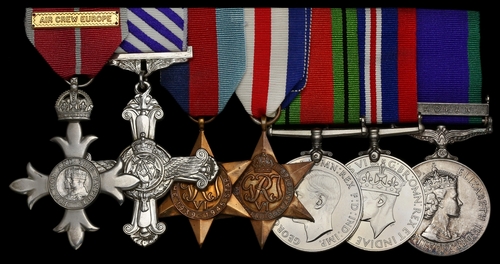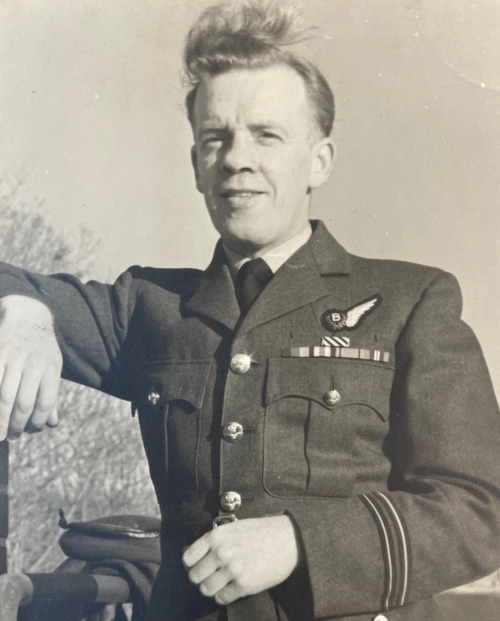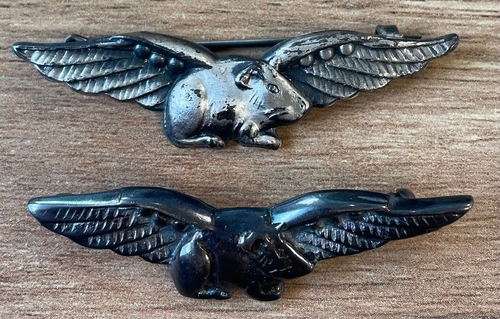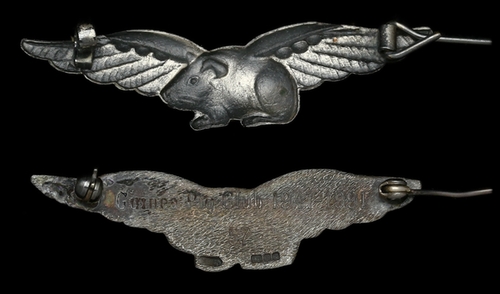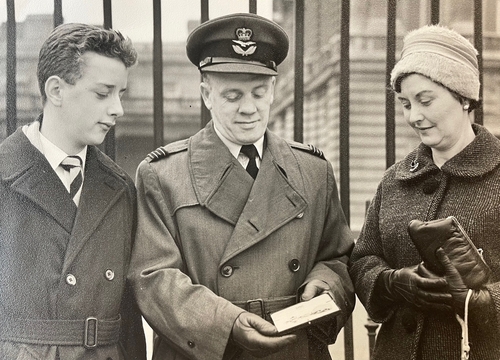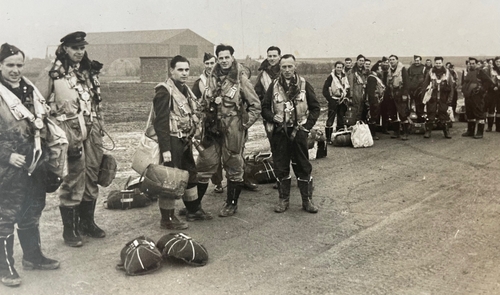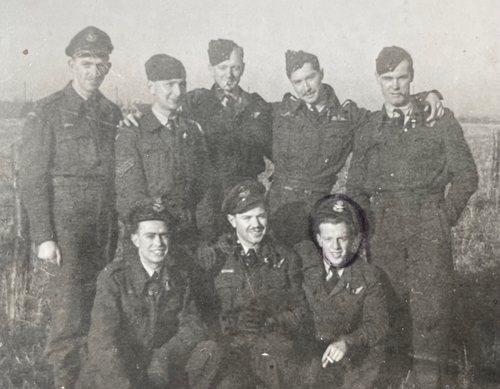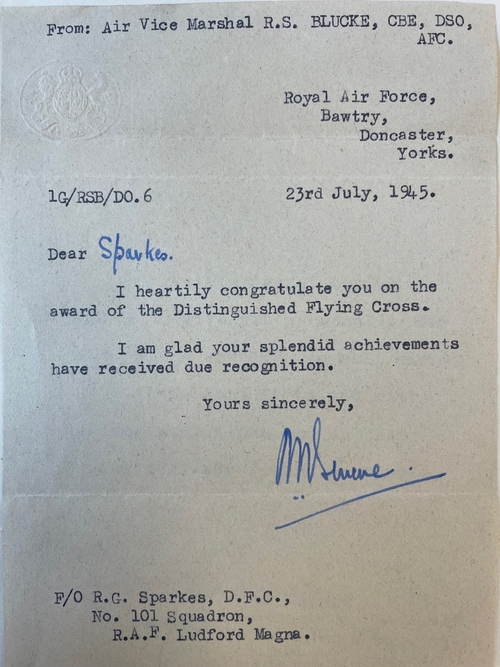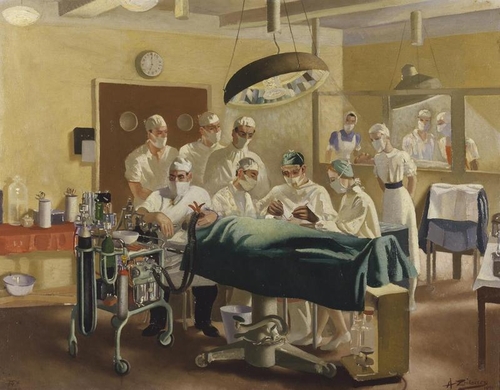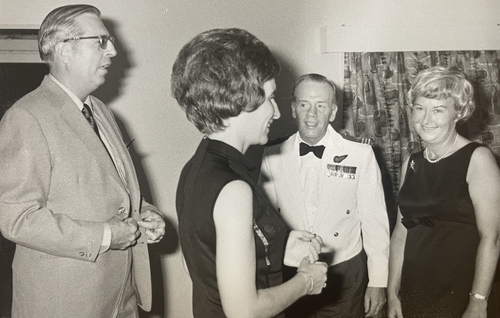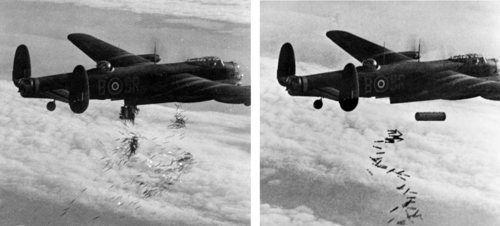Auction: 25003 - Orders, Decorations and Medals
Lot: 216
Sold by Order of a Direct Descendant
The 1960 M.B.E., 1945 D.F.C. group of seven awarded to Wing Commander R. G. Sparkes, Royal Air Force
Having flown an extended tour in the Lancasters of No. 101 Squadron - which saw him gain membership of the Guinea Pig Club in December 1944 - he rose to higher command and was the final Commanding Officer of RAF Penang at the point of its transfer to the Royal Malaysian Air Force
The Most Excellent Order of the British Empire, 2nd Type, Military Division, Member's (M.B.E.) breast Badge, silver, with its case of issue; Distinguished Flying Cross, G.VI.R., the reverse officially dated '1945', with its case of issue; 1939-45 Star; France and Germany Star, copy clasp, Air Crew Europe; Defence and War Medals 1939-45; General Service 1962-2007, 1 clasp, Radfan (Sqn. Ldr. R. G. Sparkes. R.A.F.), good very fine, housed in Spink & Son leather case (7)
M.B.E. London Gazette 3 June 1960.
D.F.C. London Gazette 20 July 1945.
Ronald George Sparkes was a native of Neath and with the outbreak of the Second World War, went out to Canada to complete his training. Passed as an Air Bomber in November 1943, he was duly commissioned and joined No. 101 Squadron at Ludford Magna in August 1944 for a tour of duty. Crewing up with Flying Officer Wagner as Pilot, Pilot Officer Holden as Navigator and Sparkes as Air Bomber, they remained a close team and operated in Lancasters. Sparkes and his comrades would complete an extended tour of some 38 Ops from 17 September 1944-12 March 1945. All three officers took the D.F.C., having had a particularly busy Christmas period, flying on Cologne on Christmas Eve and St Vith on Boxing Day. Sparkes was badly burned after a crashed landing on 5 December 1944 after Ops on Soest when bombing the railway yards. He was transferred to the Queen Victoria Hospital, East Grinstead and went under the knife of the famed Kiwi surgeon Sir Archibald McIndoe - thus gaining membership of the famed 'Guinea Pig Club'.
The club committee was carefully selected; Sir Archibald (affectionately known as 'the boss' or 'the maestro') was the first president. The Guinea Pigs' sense of humour is evident in the club's constitution: the first secretary had severely damaged fingers encouraging minimal minute taking, while the severely damaged legs of the first treasurer made him unlikely to 'walk off' with club funds. To become a Guinea Pig, members had to be aircrew and have undergone two surgeries performed by McIndoe.
Most of the club would be made up of British pilots or bomber crewmen. However, a number of Guinea Pigs were Canadian, Australian, New Zealanders, American and East European. As the numbers of casualties grew, McIndoe increased the numbers of people in his surgical team at East Grinstead. A key addition to the team in January 1942 was Canadian plastic surgeon, Dr Ross Tilley, who helped McIndoe with his pioneering techniques.
McIndoe's 'boys' were allowed to wear their own service uniforms whilst recovering and a supply of beer was always on tap in the form of the barrel kept in the ward. The formation of the club was a key part of rehabilitation, using camaraderie and the shared experiences of the men to help support each other during their lengthy and painful rehabilitation.
For some members of the club their disfigured features were too much for their wives and girlfriends to cope with and their pre-war relationships ended at a most traumatic time. However, a number of them ended up marrying nurses from the hospital as they got used to seeing past their injuries. The people of Britain were indebted to all personnel from the armed services for their valiant efforts during World War Two, and the Guinea Pigs met and talked of their experiences to many people, including Sir Winston Churchill.
Psychological support was also needed when the Guinea Pigs left the protection of the hospital ward and re-entered society to face the general public, whose responses were often not kind when seeing their disfigurements. Visits up to London were often accompanied by horrified onlookers and comments about not letting them out in public.
McIndoe then put out a request that hospital staff and the welfare committee should spread the word that any injured airman in town must not be made to feel uncomfortable and be regarded as "normal young men who happen to be in temporary difficulty." The people of East Grinstead thus became a key part of McIndoe's vision and were fundamental in the rehabilitation process. The people of East Grinstead and the warmth and acceptance that they showed to the Guinea Pigs were quite rightly given the accolade of 'the town that didn't stare'.
Fortunately, many people showed extraordinary kindness to the Guinea Pigs, particularly Neville and Elaine Blond who opened up their substantial house for them to stay in whilst recovering and turned a blind eye to the racket and mischief cause by the rabble of 'Pigs'.
By the end of the war, members of the Guinea Pig Club totalled 649, testament to the incredible efforts of Archibald McIndoe. Many of the Guinea Pigs managed to reintegrate into society and find work through their determination and confidence, which was drawn from the other members.
The Guinea Pigs continued to meet annually to celebrate Archibald McIndoe and the club. For many years the Guinea Pig pub in East Grinstead was a focal point for summer reunions, followed by a black-tie dinner and toasts made to 'the Queen', 'absent friends' and 'the women', completed with a rendition of the Guinea Pig anthem. Against the odds many have lived into old age.'
A comrade commented on his wounds '...they did such a wonderful job of reconstruction of Ron's face that the burns were
scarcely noticeable'. Sparkes would regularly turn out and was present for the 1991 Anniversary, taking a further Badge for his troubles (this included in the Lot).
Remaining in the service after the Second World War, he rose to become a Wing Commander, being the last Commanding Officer of 1ADX Western Hill and RAF Panang when it was handed over to the Royal Malaysian Air Force in 1971. He retired to Newton Aycliffe, was an avid follower of the Welsh rugby team and died on 2 January 2012.
Sold together with the following original archive comprising:
i)
His R.C.A.F. Flying Log Book, together with his three Fighter Controller's Log Books, covering May 1956-September 1963.
ii)
Various letters of congratulation related to his decorations.
iii)
Two Guinea Pig Club Badges, the first mid-20th century and the latter from the 1991 Anniversary, officially numbered '57' to reverse, together with 2002 Annual Dinner Programme.
iv)
Various official certificates, letters and newspaper cuttings.
v)
Photograph album covering his training in Canada and other scenes.
For his miniature dress medals, please see Lot 322.
Subject to 20% VAT on Buyer’s Premium. For more information please view Terms and Conditions for Buyers.
Sold for
£1,800
Starting price
£1400

